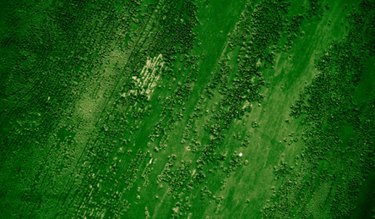Things You'll Need
Surgical gloves
Cotton cloth
Kraft paper
Neutralizer
Cotton swabs
Emulsion cleaner
Metal container
Gloss varnish
Acrylic polymer varnish
Wide paintbrush

As time passes, paintings tend to become more valuable; unfortunately, they also become dirtier. Tobacco smoke, among other pollutants, can cause a painting to look stained and old. It's possible to clean tobacco smoke from a painting following several simple steps, but the process is different according to the type of paint used in the painting. Oil paint can withstand harsher cleaners; acrylic paint, since it's water-based, is more sensitive to solvents and even water-based cleaners. Only attempt to clean a painting if the surface is stable and undamaged. Otherwise, consult a professional.
How to Clean an Oil Painting
Step 1
Put on surgical gloves to protect your hands from the chemicals. Make sure your workspace is well ventilated because the chemicals you will be using have fumes.
Video of the Day
Step 2
Lay the painting on a piece of kraft paper, face-up. Apply the neutralizer to a clean piece of cotton cloth and wipe it gently over the entire surface of the painting. This will clean off any surface dirt.
Step 3
Dip the cotton swab into the emulsion cleaner and apply it to a 2-inch square of the painting. Apply it in a rolling motion; don't use a wiping or scrubbing motion. Take care that you're only removing dirt or smoke residue and not the paint. Then neutralize the 2-inch area with the cloth containing the neutralizer.
Step 4
Repeat Step 3 until the entire painting is clean. Proceed only in 2-inch sections, using a clean cotton swab each time you need more emulsion cleaner. Dispose of used cotton cloths and swabs in a covered metal container.
Step 5
Coat the cleaned painting with gloss varnish to protect the painting and bring out its colors.
How to Clean an Acrylic Painting
Step 1
Moisten a clean cotton swab with saliva, which contains enzymes that act on dirt and smoke residue. If you prefer, use deionized water in place of saliva.
Step 2
Choose a small area of the painting that is the least noticeable. Roll the wet swab gently over the painting surface in this area, keeping the moisture to a minimum.
Step 3
Examine this small area after cleaning, ensuring there is no color pickup on the swab or change in gloss.
Step 4
Repeat Steps 2 and 3 until the entire painting is clean. Coat the painting with a layer of acrylic polymer varnish to protect it and enhance the colors.
Tip
Find all the supplies for this cleaning process at an art supply store.
Take before and after pictures of the painting for later comparison.
While you’re cleaning the painting, use a piece of linoleum under the canvas to protect it from excess pressure and stretching.
Warning
If you notice paint being removed at any time during the cleaning, abandon the project and contact a professional.
Video of the Day